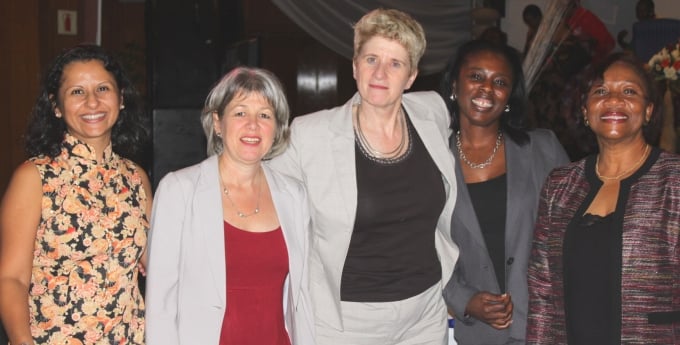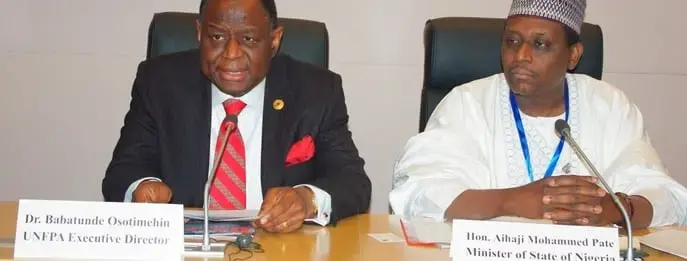ABUJA, Nigeria, 16 October 2012 — At the ministerial meeting of the United Nations Commission on Life-Saving Commodities for Women and Children (UNCC), the ministers of health of seven African countries – DR Congo, Ethiopia, Nigeria, Senegal, Sierra Leone, Tanzania and Uganda – committed to accelerating sustained and equitable access to and use of 13 life-saving commodities to all women and children in their respective countries by 2015.
The meeting, hosted by the Government of Nigeria with the support of the UNCC Secretariat, UNFPA and UNICEF from 14-16 October 2012, was a culmination of efforts by countries and the global community to address a key constraint to improving lives of women and children all over the world: weak access to life-savings commodities.
In this regard, the UNCC was established to take on the challenge outlined in the UN Secretary General’s Global Strategy on Women’s and Children’s Health. AReport with ten clear recommendations was produced by the UNCC and launched on 26 September 2012 as part of the Every Woman, Every Child (EWEC) movement. I ncreasing equitable access to life-saving commodities and their appropriate use could save the lives of more than 6 million women and children around the world by 2015.
In his statement, UNFPA Executive Director Dr. Babatunde Osotimehin stressed that “too often, affordable, effective medicines and health supplies do not reach the women and children who need them most,” although their availability “is an essential part of well-functioning systems that are able to serve people in an equitable manner.”
He said all participants at the meeting could contribute to saving 6 million lives by focusing on some usually low-cost but high-impact medicines. “Family planning alone can reduce one third of maternal deaths,” the ED stated.

UNFPA is committed to help increase financial and political commitment to the implementation of the recommendations of the Commission, with strong support by leaders. “Let's be together, let’s pledge that every country will have all of us working together as a continuum of care, to help governments to achieve the MDG goals, particularly health-related goals”, the ED concluded.
At the ministerial segment on 15 October, the ministers reported on their country progress and commitments towards greater access to life-saving commodities, including implementation of the UNCC’s recommendations, increase of national health budgets and/or creation of specific budget lines for commodities, and use of new communication technologies. In this regard, Senegal pledged to multiply by five the budget for family planning while Sierra Leone would increase its health budget from 8 per cent to 12 per cent in 2013.
UNFPA Deputy Executive Director Kate Gilmore said that with the presence of many ministers the political will was ensured and this would lead to transformation and progress: “We have plenty of commitments from the political leaders to make things happen.”
Partners attending the meeting committed to supporting the implementation of the recommendations, notably the US Government through USAID that endorsed the ministerial communique. The Prime Minister of Norway, Dr. Tore Godal, recalled their pledge of US$ 150 million to maternal health in Africa from 2013.
The ministers adopted a Ministerial Communique on the Implementation of the Recommendations by which they commit to:
- Undertake a review of the status of the 13 life-saving commodities, opportunities, bottlenecks and gaps in their respective countries;
- Engage national stakeholders including Parliamentarians, the private sector, civil society, technical and financial development partners;
- Develop effective scale-up plans founded on evidence-based strategies, leading to the prioritization of high-impact interventions;
- Reconvene in April 2013 to discuss their respective progress;
- Work with development partners and other stakeholders to carry out the necessary actions to ensure sustainable and equitable access to and use of life-saving commodities to all women and children in their respective countries by 2015, including relevant systems strengthening, demand creation (as part of a long-term strategic plan);
- Continue to engage their respective Governments to allocate additional funding and sustainable budget lines for life-saving commodities by 2015.
~ Hugues Koné, UNFPA, Sub-Regional Office Dakar and Kori Habib, UNFPA Nigeria Country Office, Abuja




